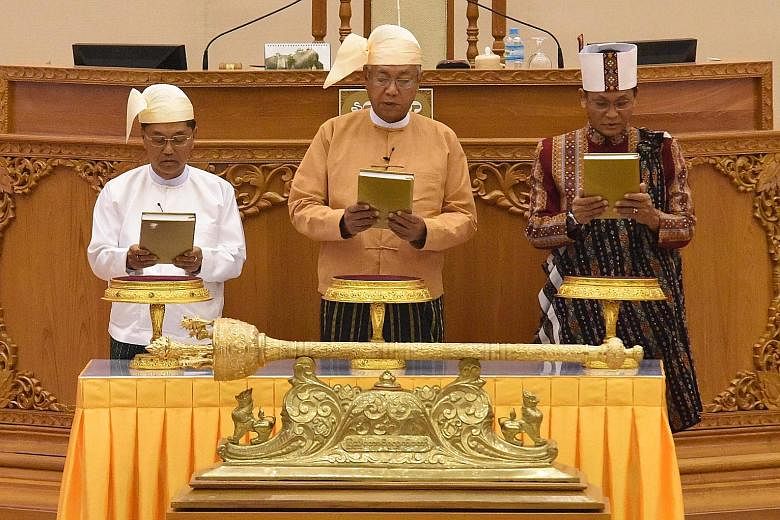Myanmar's first civilian President since 1962, Mr Htin Kyaw, was sworn in yesterday, taking power amid high public expectations of reforms and results in a country recently loosened from the military's iron grip.
In a brief ceremony held in Parliament in Naypyitaw - and watched by thousands glued to their TV sets around the country - Mr Htin Kyaw, 69, took his oath of office, as did his two Vice-Presidents, one nominated by the army and the other by the ruling National League for Democracy (NLD).
Completing the historic morning, members of the new Cabinet, including NLD leader Aung San Suu Kyi, 70, were also sworn in.
Ms Suu Kyi, who handpicked her close aide and long-time family friend for the country's top post, is in charge of foreign affairs, education, electric power and energy, and is also Minister in the President's Office.
In his speech to Parliament, President Htin Kyaw said: "The new government will strive towards national reconciliation, peace, a federal democratic union, a Constitution, and to improve the living standards of the people."
Regarding the military-crafted Constitution, which bars Ms Suu Kyi from the presidency because her two sons are British citizens, Mr Htin Kyaw said he would work towards "achieving a Constitution that has democratic norms and is suitable for the nation".
Later, he visited the Presidential Palace where he received a ceremonial sash from outgoing President Thein Sein, the 70-year-old former general who steered the country for the five occasionally turbulent years after the calibrated shift to a quasi-civilian government.
The military remains a dominant force, however. It is guaranteed 25 per cent of parliamentary and state assembly seats, and controls three key ministries - home, defence and border affairs.
The NLD's nomination of the scholarly and soft-spoken Mr Htin Kyaw, whose father-in-law was one of the party's co-founders, has been widely welcomed. The ruling party has said it wants to amend the Constitution, but would need the military's acquiescence to do so - which analysts say cannot be expected any time soon. So for now, the NLD government must cohabit with the military.
Yesterday, US President Barack Obama hailed the swearing in of Mr Htin Kyaw, calling it an "extraordinary moment", while China's Foreign Minister Wang Yi congratulated his counterpart, Ms Suu Kyi, on her appointment.
Mr Htin Kyaw's administration inherits a long list of pressing issues, including a complex and stuttering peace process, with some armed groups in the north still fighting the army, or each other.
The NLD has already annoyed some ethnic groups by appointing its own chief ministers in Myanmar's states and regions.
It faces long-running and often volatile land rights problems left over from years of arbitrary and corrupt military rule, and issues like the suspended Myitsone dam project, loathed by locals in Kachin state but backed by China, which now wants to revive it. And it has to contend with a rise in right-wing Buddhist nationalism.
"It is an historic moment for the country, " Yangon-based independent analyst Richard Horsey wrote in an e-mail. "Yet we should not lose sight of the fact that some of the biggest challenges that the country faces, such as armed conflict and communal tensions, are deep structural problems... the new government will likely find these issues just as hard to resolve as its predecessor."
Then there are the people's expectations of the new administration.
Said 47-year-old Hla Tin, a driver: "We can say everything is good now. But I can't say if President Htin Kyaw will be good or bad because he hasn't done anything yet.''


